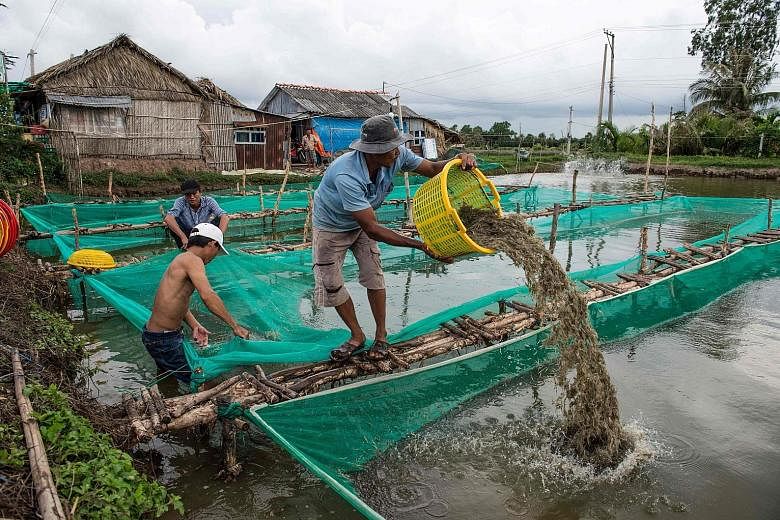SOC TRANG (Vietnam) • With a flashy gold watch and a chunky matching ring, Mr Tang Van Cuol looks a far cry from the average Vietnamese farmer as he slings back a shot of rice wine and boasts about his projected earnings.
After years eking out a living growing rice and onions or farming ducks, the 54-year-old says his life was transformed in 2000 - by shrimp.
The Mekong Delta, long renowned as the "rice bowl of Vietnam", is now also home to a multibillion-dollar shrimp industry and burgeoning numbers of farmers are building fortunes from the small crustaceans.
"Raising shrimp can bring so much income, nothing can compare," Mr Cuol says over lunch with friends, a healthy spread of rice, salad, pork and - of course - shrimp. This year he expects to make one billion dong, or around US$44,000 (S$60,000) - an enormous sum in the delta, where rice farmers make around US$100 a month.
The shrimp bonanza began in the 1990s when rising sea levels seeped saltwater into the Mekong Delta. The industry has surged in parallel with demand from the United States and European Union. Savvy locals were swift to spot that the changing conditions were ripe for shrimp farming.
The wealth has transformed Mr Cuol's home town in Soc Trang province: motorbikes have replaced bicycles on newly-paved roads dotted with multi-storey concrete homes unimaginable just a generation ago. Mr Cuol owns several motorbikes, funded his daughter's wedding and claims an impressive collection of antiques "worth hundreds of millions of dong".
But environmentalists warn that the bounty from intensive shrimp farming may be short-lived. Today, pollution and disease frequently lay waste to crustacean harvests.
But a wider crisis is looming caused by the obliteration of mangrove forests to make way for farms, exposing the area to lashings from storms and further rises in sea level linked to climate change.
"This is not sustainable," said Mr Andrew Wyatt, Mekong Delta Programme Manager at the International Union for Conservation of Nature (IUCN).
The IUCN is encouraging farmers to preserve mangroves and stop using harmful chemicals so their shrimp can be certified as organic, earning a 5 per cent to 10 per cent premium in the process. Attuned to the long-term risks, the government has resisted opening the whole region to the shrimp industry even as seawater continues to seep farther inland.
Instead, the authorities have ploughed millions of dollars into sealing off freshwater zones needed to grow rice - the nation's staple - throughout the Mekong Delta. The strategy is in part to ensure the region can grow enough rice to feed the country.
In some areas, the government is now urging farmers to grow rice half the year and harvest shrimp for the other half.
AGENCE FRANCE-PRESSE

